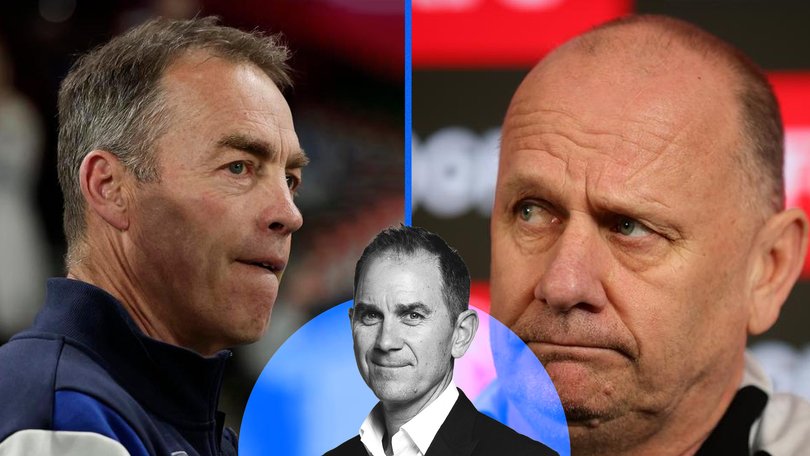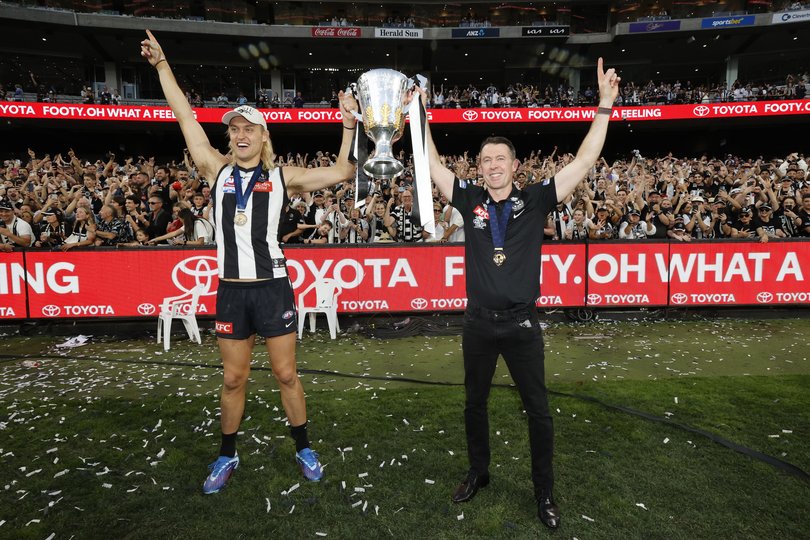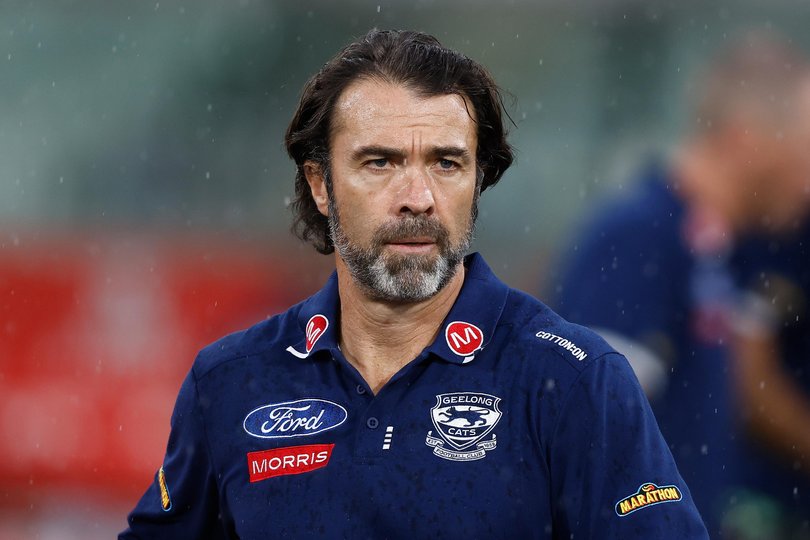JUSTIN LANGER: Ken Hinkley deserves more respect from Port Adelaide fans ahead of Hawthorn Hawks AFL final

Sack Ken Hinkley.
That must be the way to go. Just sack him.
At least, that was the opinion of some clown last weekend after Port Adelaide lost to Geelong in the of the AFL’s opening finals round.
Sign up to The Nightly's newsletters.
Get the first look at the digital newspaper, curated daily stories and breaking headlines delivered to your inbox.
By continuing you agree to our Terms and Privacy Policy.Granted, Port were thumped, but a sign posted at the headquarters of the Port Adelaide Football Club, ‘SACK KEN HINKLEY’, was a bit rich.
I would go a step further and say it was incredibly disrespectful and ignorant, probably from a passionate supporter who let their emotions get the better of them after the loss.
Emotions will be heightened or tempered tonight, depending on how Port Adelaide’s result against the emerging Hawks.
Win and Port are still hunting for a premiership; lose and their dreams have been extinguished.
Imagine the reaction if the latter result occurs. The mob won’t be calling for his sacking; a public lynching will probably be the punishment of choice for some of Port’s hardcore supporters.
All this hysteria around Hinkley got me thinking, not for the first time, about what makes a great coach.
Let’s take Hinkley as one example. We have never spent time together, but a few weeks ago, I was at a function with David Koch, the president of Port Adelaide, and I asked him about their head coach.
Kochie’s automatic reaction was that you will never meet a finer person. He said: “A man of great integrity, with the strongest of values. An outstanding man.”
Then we look at his coaching record.
This season, Port finished second on the ladder. They won 16 games, just one less than the leaders Sydney Swans. That’s 16 weeks of happiness for their loyal supporters. The week always feels better after your team wins.
Hinkley arrived at Alberton tasked with reviving the club’s fortunes.
Having lived at the Alberton Hotel, our lodgings when I was in the Australian Institute of Sport’s Cricket Academy back in 1989 (that’s another story), I can say from firsthand experience that there are no more vocal and passionate supporters than those that live in the port suburb.
In his first season, he answered the call with a preliminary final. Now in his 12th season of coaching, he has led his club to seven finals’ campaigns, including three preliminary finals.
His tenure has been a rollercoaster of emotion, each season a new loop on the tracks.
The highs? Soaring prelims and top-four finishes that left fans dizzy with possibilities.
The lows? Crushing defeats and missed opportunities plummeted spirits to the pit of despair, leading to calls for his head.
Through it all, Hinkley has remained stoic, his jawline as square and unmovable as his resolve. He’s a lightning rod for criticism, yet a beacon of stability in a league of coaching carousel chaos.
So, is Hinkley a good coach or a poor coach?
The facts all point to him being an outstanding coach by any metric, except he has yet to win a premiership — a task that is incredibly difficult to achieve. In history, most coaches (about 80 per cent) have never won a premiership, which means Hinkley is not alone in this quest.
Last year, Collingwood won the flag, and a dynasty of success was predicted. This year, they didn’t make the finals. Does that make Craig McRae a good coach or a lousy coach? Of course, he is a good coach; in fact, he is an excellent coach, a premiership coach.

Alastair Clarkson, arguably the greatest coach of this generation, has won four premierships with Hawthorn, including three consecutive flags between 2013-2015. He is currently coaching North Melbourne, who finished bottom of the ladder this year. Good coach or poor coach?
I used to marvel at Chris Scott, and the criticism directed at him. He won his first premiership in his debut season as senior coach in 2011 and led Geelong to another premiership in 2022.
He has also coached the team to several preliminary finals and grand final appearances. Yet, between 2011 and 2022, he was often criticised for making finals but not taking the final step of winning a flag.
This prompted me to think, if I am a football club supporter, would I prefer to win most games through the season and fall short at the final hurdle or ride a rollercoaster of rebuilding, losing a lot, hoping to win a flag years later?
Scott’s winning record is 73.7 per cent. That means his supporters get to celebrate and feel good about life most weeks of a football season for the last 13 years.
Putting this in perspective, the greatest coaches in AFL history all fall short of Scott’s record. Jock McHale 66.1 per cent, John Longmire 65.7 per cent, Tom Hafey 64.2 per cent, David Parkin 62.5 per cent, Kevin Sheedy 61.7 per cent, Ron Barrasi 60.7 per cent, Mick Malthouse 57.4 per cent and Leigh Matthews 57.3 per cent.
No coach has a better record, and yet even the greatest of coaches get criticised. Why? It’s not that they are above criticism, but sometimes our expectations as passionate supporters are beyond perfection.
Melbourne won the AFL premiership at Optus Stadium in 2021, in one of the most mesmerising displays of team football I have ever seen in any sport in my life.
Simon Goodwin was the messiah. If you are to believe some of the media today, he is now a dud. Good coach, horrible coach? Seriously?
Premierships or finals are hard to win in any sport because almost everything must go right for a coach and their team.
So much is out of their control that even the best-laid plans can come unstuck in the least opportune moments.
For example, injuries to your players, the ups and downs of form and the ultimate challenge of how your opponent is playing on the day are, to an extent, uncontrollable. And yet, they can have such an impact on the results of a game and a season.
The same is true in business. The cost of living, interest rates, commodity prices, and retaining and attracting the best talent often affect the results of an organisation. Usually, these are uncontrollable for a business owner, chief executive or chairman, yet their heads are on the blocks when a downturn arises.
Great coaches and leaders must be able to inspire and motivate their athletes and people. They must have clear communication of goals and expectations and they must lead by example and maintain high standards.
Technical knowledge is crucial, as is a deep understanding of the sport or business’ rules, tactics, and strategies. They must be able to analyse performance and identify areas for improvement whilst staying updated with evolving trends in the sport or industry.
They must also have strong teaching and communication skills by breaking down complex concepts into simplified and understandable principles.

Great leaders need to adapt their coaching styles to different learning types and personalities and provide clear, consistent, and constructive feedback to their people.
Emotional intelligence is pivotal, with a strong understanding and management of team dynamics and an ability to connect with people on a personal level, while managing stress and pressure in high-stakes situations.
A long-term vision for team development and an ability to make crucial decisions under pressure are traits of the best leaders.
As is an adaptability for adjusting strategies based on opponents and circumstances and a willingness to innovate and try new approaches.
The best coaches are brilliant people managers who are flexible in handling diverse personalities and situations; and they can identify and nurture talent while balancing short-term goals with long-term development.
They must also have an impeccable work ethic, dedication to continuous improvement, attention to detail in preparation and analysis, and a willingness to lead by example in commitment and effort.
All these attributes are underpinned by a high level of integrity and ethics, which includes maintaining fairness and respect, upholding values, being a positive role model and making decisions that prioritise their people’s well-being over everything else.
Sounds simple.
But it’s not.
So next time, when we want to throw stones or “sack them all” when they don’t win a premiership every year or make a profit every month, it’s probably worth reflecting on how easy it is from our cheap seats.
